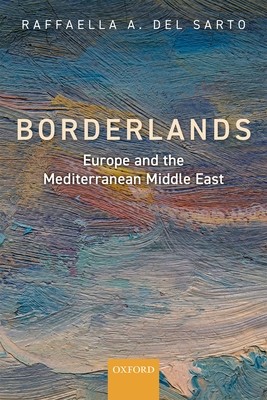
- We will send in 10–14 business days.
- Author: Raffaella A del Sarto
- Publisher: Oxford University Press, USA
- ISBN-10: 0198833555
- ISBN-13: 9780198833550
- Format: 16.5 x 24.6 x 2 cm, hardcover
- Language: English
- SAVE -10% with code: EXTRA
Reviews
Description
This is an open access title available under the terms of a CC BY-NC-ND 4.0 International licence. It is free to read at Oxford Scholarship Online and offered as a free PDF download from OUP and selected open access locations.
Borderlands: Europe and the Mediterranean Middle East proposes a profound rethink of the complex relationship between Europe-defined here as the European Union and its members-and the states of the Mediterranean Middle East and North Africa (MENA), Europe's 'southern neighbours'. These relations are examined through a borderlands prism that conceives of this interaction as of one between an empire of sorts, which seeks to export its order beyond the border, and the empire's southern borderlands. Focusing on trade relations on the one hand, and the cooperation on migration, borders, and security on the other, the book revisits the historical origins and modalities of Europe's selective rule transfer to MENA states, the interests underwriting these policies, and the complex dynamics marking the interaction between the two sides over a twenty-year period (1995-2015). It shows that within a system of structurally asymmetric economic relations from which Europe and MENA elites benefit themost, single MENA governments have been co-opted into the management of border and migration control where they act as Europe's gatekeepers. Combined with specific policy choices of MENA governments, Europe's selective expansion of its rules, practices, and disaggregated borders have in fact contributed to rising socio-economic inequalities and the strengthening of authoritarian rule in the 'southern neighbourhood', with Europe tacitly tolerating serious violations of the rights of refugees and migrants at its fringes. Challenging the self-proclaimed benevolent nature of European policies and the notion of 'Fortress Europe' alike, the findings of this study contribute to broader debates on power, dependence, and interdependence in the discipline of International Relations.
EXTRA 10 % discount with code: EXTRA
The promotion ends in 20d.18:50:07
The discount code is valid when purchasing from 10 €. Discounts do not stack.
- Author: Raffaella A del Sarto
- Publisher: Oxford University Press, USA
- ISBN-10: 0198833555
- ISBN-13: 9780198833550
- Format: 16.5 x 24.6 x 2 cm, hardcover
- Language: English English
This is an open access title available under the terms of a CC BY-NC-ND 4.0 International licence. It is free to read at Oxford Scholarship Online and offered as a free PDF download from OUP and selected open access locations.
Borderlands: Europe and the Mediterranean Middle East proposes a profound rethink of the complex relationship between Europe-defined here as the European Union and its members-and the states of the Mediterranean Middle East and North Africa (MENA), Europe's 'southern neighbours'. These relations are examined through a borderlands prism that conceives of this interaction as of one between an empire of sorts, which seeks to export its order beyond the border, and the empire's southern borderlands. Focusing on trade relations on the one hand, and the cooperation on migration, borders, and security on the other, the book revisits the historical origins and modalities of Europe's selective rule transfer to MENA states, the interests underwriting these policies, and the complex dynamics marking the interaction between the two sides over a twenty-year period (1995-2015). It shows that within a system of structurally asymmetric economic relations from which Europe and MENA elites benefit themost, single MENA governments have been co-opted into the management of border and migration control where they act as Europe's gatekeepers. Combined with specific policy choices of MENA governments, Europe's selective expansion of its rules, practices, and disaggregated borders have in fact contributed to rising socio-economic inequalities and the strengthening of authoritarian rule in the 'southern neighbourhood', with Europe tacitly tolerating serious violations of the rights of refugees and migrants at its fringes. Challenging the self-proclaimed benevolent nature of European policies and the notion of 'Fortress Europe' alike, the findings of this study contribute to broader debates on power, dependence, and interdependence in the discipline of International Relations.


Reviews